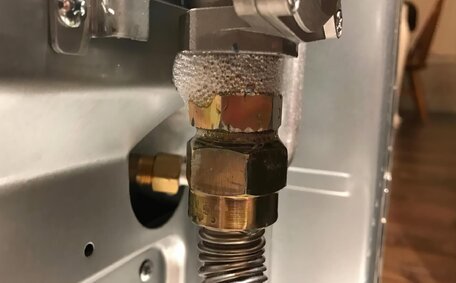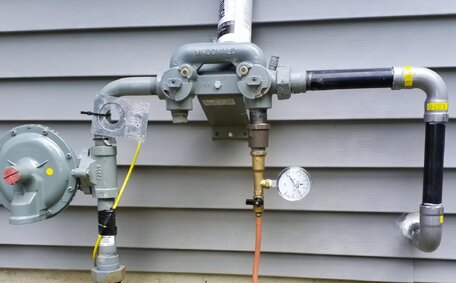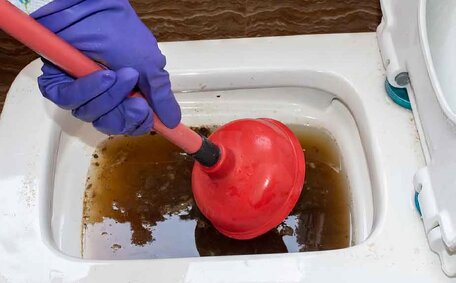Introduction to Chemical Drain Cleaners
Many households turn to liquid drain cleaners for a simple solution to clogs and blockages. Products such as Drano and Liquid-Plumr entice many homeowners with promises of swiftly tackling stubborn pipe blockages. But are these convenient, chemical drain cleaners safe for your pipes and plumbing as they claim? There are undeniable risks involved when introducing harsh chemicals like lye or sulfuric acid down drain passageways that link to the delicate materials within your home’s drainage system.
This article examines key safety concerns when using chemical drain cleaners for clogged drains. We’ll explain why recommended alternatives to chemical drain cleaners include simple homemade solutions.
Let’s discuss how substances like sodium hydroxide and muriatic acid can harm pipes, disrupt septic systems, and affect wastewater treatment processes. Our team of drain specialists in Kenthurst, Sydney can provide professional advice for maintaining plumbing and alternative ways to prevent clogs from forming in the first place.
Ingredients in Chemical Drain Cleaners and How They Work
Common Ingredients in Chemical Drain Cleaners
Commercial drain cleaners often contain harsh ingredients such as:
- Caustic soda (sodium hydroxide) - A caustic base that reacts with fats and grease to make soap, allowing clogs to dissolve.
- Sulfuric acid - Highly corrosive acid that burns through organic material.
- Bleach - Oxidising agent that breaks down gunk and debris.
- Hydrochloric acid - Reacts aggressively with clogs to clear pipes.
How Ingredients Attack Clogs
Drain cleaners can effectively dissolve, disintegrate, or remove blockages in many situations. Lye and sulfuric acid undergo saponification and oxidation reactions. Acidic cleaners like hydrochloric and sulfuric acid essentially corrode through organic sludge. Bleach helps break down the physical clog structure through oxidation reactions.
These cleaners create heat and fizzing action as they react chemically with fats, grease, hair, food particles, and soap residue.
Most ingredients in chemicalbased drain solutions have the potential to affect all drain materials, being highly caustic (lye pH 13.5, sulfuric acid pH 1.0). This high acidity or alkalinity accelerates the reactions and aggressive penetration into clogs. But it also makes them destructive to pipes, rubber seals, septic systems and hazardous if mishandled.
Risks and Dangers of Using Chemical Drain Cleaners
Dangers to Health and Safety
Ingredients such as sulfuric acid, lye, bleach, and hydrochloric acid are hazardous and can cause severe skin or eye burns, potentially leading to blindness if splashed.
Combining different chemicals in drain cleaners can generate dangerous chlorine gas. Chemical drain cleaner products can pose serious risks if handled improperly. Using liquid drain solutions in an enclosed space can cause damage to your airways, as it allows hazardous fumes to be inhaled.
Pipe and Plumbing Damage
The corrosive nature of these chemicals can erode the interior of plumbing systems, impacting the seamless flow of waste through pipes.
Particularly at risk are older pipes, which can sustain severe damage from these cleaners. Tree root infestations also become irreparable.
Environmental Effects
Chemical drain cleaners flow down your drains into local waterways, disturbing ecosystems. Their active chemical reactions continue downstream and can cause damage to wildlife, disturbing the balance of aquatic environments.
Ingredients like lye caustic soda and bleach alter acidity levels. Sulfuric acid reacts with organic compounds, releasing toxic fumes.
Damage to Plumbing and Pipes
Corrosion of Metal Pipes and Joints
Clogs can form frequently when metal components are corroded over time by the acidic and alkaline ingredients in chemical drain cleaners. Copper, cast iron, steel and galvanised piping will all eventually show signs of corrosion after repeated exposure. The caustic chemicals eat away your drain’s metal walls and protective inner linings.
This accelerated deterioration of drain pipes can be mitigated by regularly flushing with hot water to prevent buildup at threaded joints and elbows. It also weakens points prone to future blockages like roots or buildup. Damaged drainage pipes become more difficult and expensive to access and replace.
PVC and Plastic Pipe Damage
PVC pipes fare better when comes to resilience, being more resistant than metal, yet still suffering degradation from chemical drain cleaners. Cracks form from exposure to ingredients like muriatic acid or lye at pH extremes. This degradation can also lead to leaks and roots penetrating piping over time.
Rubber gaskets, washers, and seals in joints and fittings are also prone to corrosion. This causes leakage into wall cavities or under floors. It also allows sewer gases to enter living spaces - bringing bacteria, moulds and bad odours along with them.
Septic and Sewage Issues
Chemical drain cleaners can upset the bacterial balance in septic tanks, disrupting their function. Improper use can destroy the beneficial bacteria vital for waste decomposition. This allows solid waste accumulation, reducing absorption and increasing blockage risks.
It also kills aerobic microbes that treat greywater.
Fats, oils, and grease washed downstream with cleaners can re-congeal and clog your municipal sewers as well.
Caustic ingredients can damage the biofilms that line pipes, which help control odours and corrosion. They react with waste to form toxic gases. In severe cases, drain cleaners can result in pipe deterioration and even explosions.
Health and Safety Concerns
Dangers of Chemical Burns
Mishandling chemical drain cleaners can result in severe burns, especially to the face, eyes and hands. Ingredients like lye, acids, and bleach can burn skin instantly at the point of contact. Burns require immediate medical attention, so have the poison control information centre number handy before using any cleaner.
Toxic Fumes
In enclosed spaces, chemical drain cleaners can emit toxic fumes that accumulate and pose a serious inhalation risk. This poses a serious risk to your health if inhaled, causing throat irritation, coughing, and breathing difficulties. Always use cleaners in a well-ventilated area.
Unsafe Around Children and Pets
Beyond their internal harm if ingested, these chemical cleaners also pose risks from accidental exposure, particularly around children and pets. Ensure these cleaners are locked away and handled thoughtfully, keeping children pets’ safety at the forefront of your mind.
For the safety of both people and property, ensure you wear safety gear when handling commercial drain cleaning solutions. Contact our team before attempting dangerous DIY methods.
Environmental Impact
Pollution of Waterways
Subjecting residential drains to harsh chemicals often necessitates a decision to call professional help, as these substances flow into and potentially endanger local creeks, rivers and oceans. Active ingredients like lye, acids and bleach continue reacting as they travel through waterways. This disrupts delicate aquatic environments by altering acidity levels, releasing toxic fumes, and disturbing ecosystems.
Harm to Wildlife
The downstream effects of chemical drain cleaners also impact marine life and animals that rely on water sources. Contaminants change pH balances suitable for wildlife and can harm fish gills and protective mucus. Wildlife exposed to concentrated cleaner ingredients or fumes may experience tissue burns, breathing issues, or even death.
Wastewater Treatment Issues
Municipal water treatment plants are disrupted by ingredients in chemical drain cleaners entering sewer systems.
At Kenthurst Plumbing, we care about the safety of our community and environment. Our drain specialists use professional-grade cleaning solutions designed to target blockages, not just transfer issues further downstream. We diagnose underlying problems and teach preventative methods for long-term drain care.
Alternatives to Chemical Drain Cleaners
Rather than reaching for hazardous chemical drain cleaners, there are several safer methods you can try first to clear clogs.
Mechanical Drain Cleaning
Before you decide to use chemical drain cleaners, consider using a plunger which creates suction to get rid of blockages.
Insert the plunger over the drain opening and rapidly pump up and down.
Natural Drain Cleaners
An effortless homemade solution is combining a half cup baking soda with a half cup vinegar—the vinegar baking soda mix can then be introduced to your drain. When the baking soda vinegar mixture is poured into drain, the chemical reaction dissolves gunk while the fizzing action helps to dislodge it. Alternatively, try an enzymatic cleaner like Bio-Clean which uses natural bacteria to break down organics.
When to Call a Professional Plumber
While chemical drain cleaners may seem like an easy DIY solution, there are certain situations where it’s imperative to call a professional plumber instead.
Signs You Need a Pro
- Clogs from years of buildup
- Presence of tree roots or foreign objects
- Slow-draining sinks across multiple fixtures
- Significant sewer line issues
- Recurring clogs that always return
- Complete blocked drain instances
- Leaks, cracks or major pipe damage
The Benefits of Professional Drain Cleaning
At Kenthurst Plumbing, Our licenced technicians have industrial-grade equipment to safely clear a stubborn clog and diagnose the root cause. We inspect drains using video cameras, locate buried pipes without digging, and perform preventative maintenance.
We also adhere to strict environmental guidelines when clearing drains to avoid contamination. Our goal with drain clearing is to save your plumbing and keep pipes clear long-term without damaging infrastructure or the surrounding habitat.
We recommend using trusted experts like our team at Kenthurst Plumbing in Sydney for reliable cleaning of clogged drains without risks. Call us or email about your drain issues today.
How to Prevent Clogs and Maintain Drains
Regular Drain Maintenance
Regular maintenance is crucial to dissolve grease and maintain the efficiency of your drains.
Each month, pour a half-cup of baking soda followed by a half-cup of vinegar down the drain, and rinse with water for thorough cleaning.
Avoid Harsh Chemicals
Contrarily, chemical drain cleaners can do more harm than good, posing a risk to your plumbing with prolonged use. The caustic ingredients damage pipes and ruin plumbing over time. Opt for mechanical methods such as plungers, drain snakes, or boiling water instead.
Install Drain Screens
Use hair catchers in sinks and showers to keep hair from clogging pipes.
Don’t Pour Fats, Oils or Grease
Oils and fats congeal upon cooling, adhering to the walls of pipes. This allows other debris to gather and blocks drainage. Collect cooking oils and fats for disposal, and install drain screens to keep them out of your plumbing.
Monitor Any Leaks
Small leaks around joints or seals allow moisture into pipes that corrodes over time. This can result in cracks that may lead to future blockages. Regularly check plumbing fittings and contact a plumber at any sign of water damage or leaks.






